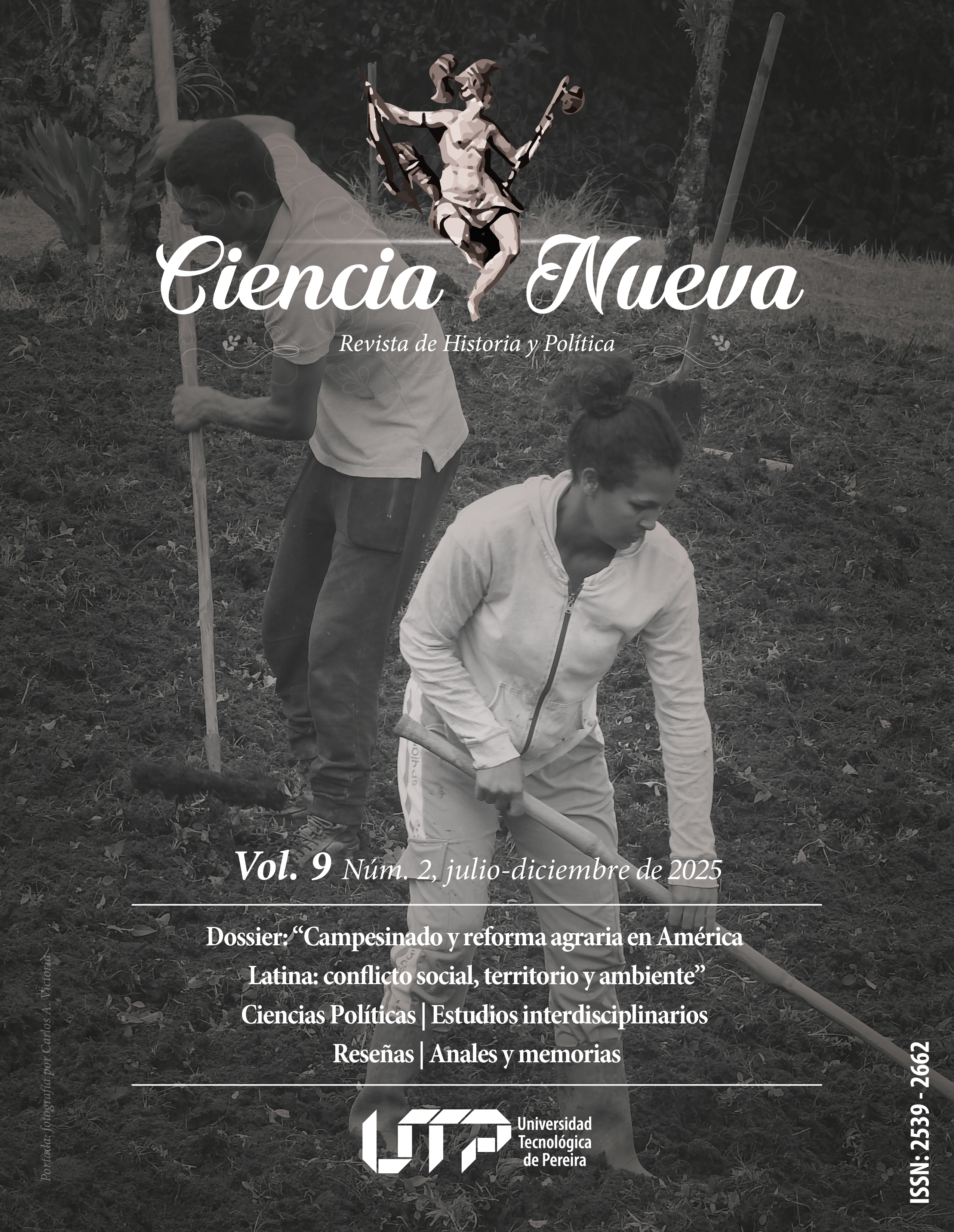The Decline of Participatory Democracy: Determinants of Voter Abstention in Peru’s Regional Elections (2014, 2018, and 2022)
DOI:
https://doi.org/10.22517/25392662.25677Keywords:
electoral abstention, regional elections, political participation, democratic perception, institutional distrustAbstract
Electoral abstention raises serious concerns about the health of democratic systems, as it reflects not only voter apathy but also deeper structural problems such as institutional distrust and the perception of corruption. This study analyzes the determinants of electoral abstention in Peru during the 2014, 2018, and 2022 elections. Variables considered include poverty, perceptions of regional and central government performance, corruption, the disappearance of winning political parties in the subsequent electoral cycle, and citizens’ perception that democracy does not protect their rights. Using the Generalized Panel Data Model (GDPM), the findings indicate that poverty, corruption, and institutional distrust are key factors affecting electoral participation. Furthermore, citizens’ perception that democracy fails to safeguard their rights, along with the disappearance of regional political parties, has exacerbated apathy and distrust toward the electoral process, thereby increasing abstention rates.
Downloads
References
Anderson, C. J., y Tverdova, Y. V. "Corruption, Political Allegiances, and Attitudes Toward Government in Contemporary Democracies." American Journal of Political Science 47, n.o 1 (2003): 91-109.
Bartels, L. M. Unequal Democracy: The Political Economy of the New Gilded Age. Princeton: Princeton University Press, 2008.
Beetham, D. The Legitimation of Power. Macmillan International Higher Education, 1991.
Blais, A. «¿Qué Afecta a la Participación Electoral?». Revista Española de Ciencia Política 18 (2013): 9-27. https://recyt.fecyt.es/index.php/recp/article/view/37456.
Brady, H. E., Verba, S., y Schlozman, K. L. "Beyond SES: A Resource Model of Political Participation." American Political Science Review 89, n.o 2 (1995): 271-294.
Breusch, T. S., y Pagan, A. R. "The Lagrange Multiplier Test and Its Applications to Model Specification in Econometrics." The Review of Economic Studies 47, n.o 1 (1980): 239-253.
Cancela, J., y Geys, B. "Explaining Voter Turnout: A Meta-Analysis of National and Subnational Elections." Electoral Studies 42 (2016): 264-275.
Carreras, M., y Castañeda-Angarita, N. "Economic Adversity and Electoral Participation of Vulnerable Socioeconomic Groups." Electoral Studies. https://doi.org/10.1016/j.electstud.2018.11.004.
Contraloría General de la República. Informe de Gestión Pública 2021. Lima: Contraloría General de la República, 2021.
Dahl, R. A. Polyarchy: Participation and Opposition. New Haven: Yale University Press, 1971.
Downs, A. An Economic Theory of Democracy. Harper and Row, 1957. http://www.jstor.org/stable/1827369.
Elections Canada. "Voter Turnout in Federal Elections." Elections Canada, 2021. https://www.elections.ca/.
European Parliament. "2019 European Election Results." 2019. https://election-results.eu/.
Franklin, M. N. Voter Turnout and the Dynamics of Electoral Competition in Established Democracies Since 1945. Cambridge University Press, 2004.
Greene, W. H. Econometric Analysis. 7ª ed. Pearson, 2012.
Gurr, T. R. Why Men Rebel. Princeton University Press, 1970.
Hausman, J. A. "Specification Tests in Econometrics." Econometrica: Journal of the Econometric Society 46, no. 6 (1978): 1251-1271.
Hetherington, M. J. "The Political Relevance of Political Trust." American Political Science Review 92, n.o 4 (1998): 791-808.
International Foundation for Electoral Systems. "Elections in Venezuela: Frequently Asked Questions." 2020. https://www.ifes.org/.
Instituto Nacional de Estadística e Informática. Informe Técnico: Pobreza Monetaria en el Perú 2019. Lima: Instituto Nacional de Estadística e Informática, 2020.
International IDEA. "Voter Turnout Database." 2021. https://www.idea.int/data-tools/data/voter-turnout.
Lijphart, A. "Unequal Participation: Democracy’s Unresolved Dilemma." American Political Science Review 91, n.o 1 (1997): 1-14.
Lipset, S. M. Political Man: The Social Bases of Politics. Doubleday, 1960.
McDonald, M. P. "Voter Turnout in the United States." United States Elections Project, 2020. http://www.electproject.org/.
Milbrath, L. W., y Goel, M. L. Political Participation: How and Why Do People Get Involved in Politics? Rand McNally College Publishing Company, 1977.
Norris, P. Critical Citizens: Global Support for Democratic Government. Oxford University Press, 1999.
Norris, P. Democratic Phoenix: Reinventing Political Activism. Cambridge University Press, 2002.
Organismo Nacional de Procesos Electorales. Resultados de las Elecciones Regionales y Municipales 2018. Lima: Oficina Nacional de Procesos Electorales, 2018.
Organismo Nacional de Procesos Electorales. Impacto de la Pandemia en la Participación Electoral. Lima: Oficina Nacional de Procesos Electorales, 2022.
PNUD. Informe sobre Desarrollo Humano en América Latina y el Caribe 2019. Nueva York: Programa de las Naciones Unidas para el Desarrollo, 2020.
Putnam, R. D. Bowling Alone: The Collapse and Revival of American Community. Simon & Schuster, 2000.
Riquelme Arriagada, A. «Desigualdad y Participación en Chile: ¿Afecta la Pobreza Multidimensional a la Participación Electoral?». Politai: Revista de Ciencia Política 11, n.o 20 (2020): 58-89. https://revistas.pucp.edu.pe/index.php/politai/article/download/24113/22912.
Rosenstone, S. J., y Hansen, J. M. Mobilization, Participation, and Democracy in America. Macmillan, 1993.
Rosset, J. Economic Inequality and Political Representation in Switzerland. Springer Cham, 2016. https://doi.org/10.1007/978-3-319-27117-0.
Rosset, J. "Perceptions of (Unequal) Responsiveness and Their Consequences for Electoral Participation." Journal of European Public Policy 30, n.o 8 (2023): 1565-1587. https://doi.org/10.1080/13501763.2022.2094989.
Schäfer, A., y Schwander, H. "‘Don’t Play if You Can’t Win’: Does Economic Inequality Undermine Political Equality?". European Political Science Review 11, n.o 3 (2019): 395-413. doi:10.1017/S1755773919000201.
Seligson, M. A. (2002). "The Impact of Corruption on Regime Legitimacy: A Comparative Study of Four Latin American Countries." Journal of Politics 64, n.o 2 (2002): 408-433.
Soto-Zazueta, M. «Percepción de la Corrupción y Comportamiento Electoral en Culiacán». Revista de Economía Institucional. https://doi.org/10.18601/01245996.v21n41.10.
Downloads
-
Vistas(Views): 464
- PDF (Español (España)) Descargas(Downloads): 172
Published
How to Cite
Issue
Section
License
Copyright (c) 2025 Héctor Javier Bendezú-Jiménez, Aníbal Erik Romero Bendezú, Diana Silvia Palomino Robles, Jhordy Christian Villar Quito

This work is licensed under a Creative Commons Attribution-NonCommercial-NoDerivatives 4.0 International License.
For all articles published in Ciencia Nueva, revista de Historia y Política, the ownership of the exploitation rights of the contents of the journal belongs to the author(s).
The works of this magazine are under the Creative Commons Recognition-NonCommercial-DerivativeLicense:




